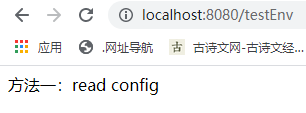启动类和核心注解
@SpringBootApplication
Spring Boot应用通常都有一个名为*Application的程序入口类,该入口类需要使用Spring Boot的核心注解@SpringBootApplication标注为应用的启动类。
Spring Boot的核心注解@SpringBootApplication是一个组合注解,主要组合了@SpringBootConfiguration、@EnableAutoConfiguration和@ComponentScan注解。
@SpringBootConfiguration注解
@SpringBootConfiguration是Spring Boot应用的配置注解,该注解也是一个组合注解,源代码可以从spring-boot-2.1.4.RELEASE.jar依赖包中查看org/springframework/boot/ SpringBootConfiguration.java。在Spring Boot应用中推荐使用@SpringBootConfiguration注解替代@Configuration注解。
@EnableAutoConfiguration注解
@EnableAutoConfiguration注解可以让Spring Boot根据当前应用项目所依赖的jar自动配置项目的相关配置。例如,在Spring Boot项目的pom.xml文件中添加了spring-boot-starter-web依赖,Spring Boot项目会自动添加Tomcat和Spring MVC的依赖,同时对Tomcat和Spring MVC进行自动配置。打开pom.xml文件,选择Dependency Hierarchy页面查看spring-boot-starter-web的自动配置
@ComponentScan注解
该注解的功能是让Spring Boot自动扫描@SpringBootApplication所在类的同级包以及它的子包中的配置,所以建议将@SpringBootApplication注解的入口类放置在项目包下(Group Id+Artifact Id组合的包名),这样可以保证Spring Boot自动扫描项目所有包中的配置。
关闭某个特定的自动配置
如果开发者不需要Spring Boot的某一项自动配置,该如何实现呢?通过查看@SpringBootApplication的源代码可知,应该使用@SpringBootApplication注解的exclude参数关闭特定的自动配置,以关闭neo4j自动配置为例,代码如下:
@SpringBootApplication(exclude={Neo4jDataAutoConfiguration.class})
定制Banner
首先,打开网站http://patorjk.com/software/taag,输入自定义字符串,单击网页下方的“Select & Copy”按钮,如图4.4所示。然后,将自定义banner字符串图案复制到src/main/resources目录下的banner.txt文件中。
关闭banner
开发者如果需要关闭banner,可以在src/main/resources目录下的application.properties文件中添加如下配置:
spring.main.banner-mode = off
Spring Boot的全局配置文件
1.设置端口号
使用全局配置文件主要用于修改项目的默认配置,如修改内嵌的Tomcat的默认端口。例如,在Spring Boot项目ch4_1的src/main/resources目录下找到名为application.properties的全局配置文件,添加如下配置内容:server.port=8888
2.设置Web应用的上下文路径
如果开发者想设置一个Web应用程序的上下文路径,可以在application.properties文件中配置如下内容:
server.servlet.context-path=/XXX
这时应该通过“http://localhost:8080/XXX/testStarters”访问如下控制器类中的请求处理方法:
@RequestMapping("/testStarters")
public String index() {
}
Spring Boot的Starters
Spring Boot提供了很多简化企业级开发的“开箱即用”的Starters。Spring Boot项目只要使用了所需要的Starters,Spring Boot就可以自动关联项目开发所需要的相关依赖。例如,我们在ch4_1的pom.xml文件中,添加如下依赖配置:
<dependency>
<groupId>org.springframework.boot</groupId>
<artifactId>spring-boot-starter-web</artifactId>
</dependency>
Spring Boot将自动关联Web开发的相关依赖,如tomcat、spring-webmvc等,进而对Web开发的支持,并将相关技术的配置实现自动配置。
通过访问“https://docs.spring.io/spring-boot/docs/2.1.4.RELEASE/reference/htmlsingle/#
using-boot-starter”官网,可以查看Spring Boot官方提供的Starters
Environment
Environment是一个通用的读取应用程序运行时的环境变量的类,可以通过key-value方式读取application.properties、命令行输入参数、系统属性、操作系统环境变量等。
添加配置文件内容
在src/main/resources目录下,找到全局配置文件application.properties,并添加如下内容:
test.msg=read config
创建控制器类EnvReaderConfigController
在控制器类EnvReaderConfigController中,使用@Autowired注解依赖注入Environment类的对象
@RestController
public class EnvReaderConfigController{
@Autowired
private Environment env;
@RequestMapping("/testEnv")
public String testEnv() {
return "方法一:" + env.getProperty("test.msg") ;
//test.msg为配置文件application.properties中的key
}
}
测试应用
启动Spring Boot应用后,默认访问地址为:http://localhost:8080/,将项目路径直接设为根路径,这是Spring Boot的默认设置。因此,我们可以通过http://localhost:8080/testEnv测试应用(testEnv与控制器类ReaderConfigController中的@RequestMapping("/testEnv")对应)
<project xmlns="http://maven.apache.org/POM/4.0.0"
xmlns:xsi="http://www.w3.org/2001/XMLSchema-instance"
xsi:schemaLocation="http://maven.apache.org/POM/4.0.0 http://maven.apache.org/maven-v4_0_0.xsd">
<modelVersion>4.0.0</modelVersion>
<parent>
<groupId>org.springframework.boot</groupId>
<artifactId>spring-boot-starter-parent</artifactId>
<version>2.1.4.RELEASE</version>
<relativePath /> <!-- lookup parent from repository -->
</parent>
<groupId>com.bb</groupId>
<artifactId>SpringBootConfg</artifactId>
<packaging>war</packaging>
<version>0.0.1-SNAPSHOT</version>
<name>SpringBootConfg Maven Webapp</name>
<properties>
<java.version>11</java.version>
</properties>
<url>http://maven.apache.org</url>
<dependencies>
<dependency>
<groupId>org.springframework.boot</groupId>
<artifactId>spring-boot-starter-web</artifactId>
</dependency>
<dependency>
<groupId>org.springframework.boot</groupId>
<artifactId>spring-boot-starter-test</artifactId>
<scope>test</scope>
</dependency>
<dependency>
<groupId>org.springframework.boot</groupId>
<artifactId>spring-boot-configuration-processor</artifactId>
<optional>true</optional>
</dependency>
</dependencies>
<build>
<finalName>SpringBootConfg</finalName>
<plugins>
<plugin>
<groupId>org.springframework.boot</groupId>
<artifactId>spring-boot-maven-plugin</artifactId>
</plugin>
</plugins>
</build>
</project>
package com.ch.ch4_1.controller;
import org.springframework.beans.factory.annotation.Autowired;
import org.springframework.core.env.Environment;
import org.springframework.web.bind.annotation.RequestMapping;
import org.springframework.web.bind.annotation.RestController;
@RestController
public class EnvReaderConfigController {
@Autowired
private Environment env;
@RequestMapping("/testEnv")
public String testEnv() {
return "方法一:" + env.getProperty("test.msg");
}
}
package com.ch.ch4_1;
import org.springframework.boot.SpringApplication;
import org.springframework.boot.autoconfigure.SpringBootApplication;
@SpringBootApplication
public class Ch41Application {
public static void main(String[] args) {
SpringApplication.run(Ch41Application.class, args);
}
}





